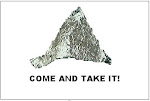When the state bears the sword to enforce drug prohibition, it does so in vain as doing so not only fails to accomplish what it set out to accomplish, but in fact accomplishes the opposite. Prohibition is merely the state flexing its might in order to be seen as mighty. This is vanity. It is not done for our good, and it only rewards and increases evil.
Prohibition makes the authority of the state illegitimate. By agressing against peaceful people and barring them access to the civil courts, prohibition delegitmizes the government that enforces it. Biblically, a government that enforces prohibition does not fit the definition of an authority that ought to be obeyed:
“For he is God’s minister to you for good. But if you do evil, be afraid; for he does not bear the sword in vain; for he is God’s minister, an avenger to execute wrath on him who practices evil.”
Romans 13:4 NKJV
Prohibition delegitmizes good government and legitimizes violence.
Prohibition doesn't prevent the prohibited item from coming to market, it only prohibits those involved in the transaction from accessing the courts to resolve their disputes. Prohibition guarantees fraud as victims cannot appeal to the civil courts for fear of the criminal ones. Prohibition prohibits the state from hearing the pleas of injustice from those victimized as a part of the drug trade. It only allows the state to deal with everyone involved as a criminal.
Prohibition incentivizes violence because those parties in conflict have been disenfranchised from the proper role of the government, the administration of justice. If they are facing the sword of the state simply for entering into the transaction, what difference does it make if they face the same sword for cheating, stealing, or killing? So fraud and violence are encouraged and violence becomes a much more common method of conflict resolution.
The incentive to deal honestly is actually greatly diminished by prohibition. If the state removes the risk of the sword from the transaction itself, but appropriately keeps bearing it upon those who commit acts of fraud and violence, then the risk of committing fraud or violence becomes much higher than the risk of simply dealing honestly. This makes our communities safer as drug transactions would become normalized and as prone to violence as a trip to the store for bread and milk.
As a drug policy, prohibition not only fails to rid or even reduce the amount of drugs on the streets, but it also invites violence into our communities. It is prohibition, the misapplication of the sword of the state, and not the drug dealing itself, that must be targeted and eliminated in order to protect the peace.
